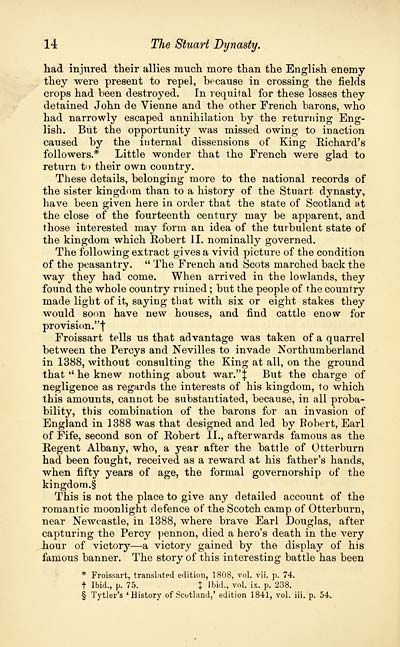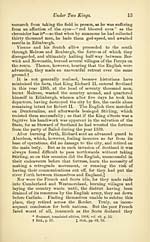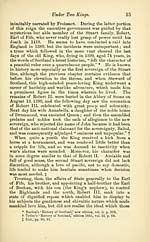Stuart dynasty
(34) Page 14
Download files
Complete book:
Individual page:
Thumbnail gallery: Grid view | List view

14 The Stuart Dynasty.
had injured their allies much more than the English enemy
they were present to repel, because in crossing the fields
crops had been destroyed. In requital for these losses they
detained John de Vienne and the other French barons, who
had narrowly escaped annihilation by the returning Eng-
lish. But the opportunity was missed owing to inaction
caused by the internal dissensions of King Eichard's
followers.* Little wonder that the French were glad to
return to their own country.
These details, belonging more to the national records of
the sister kingdom than to a history of the Stuart dynasty,
have been given here in order that the state of Scotland at
the close of the fourteenth century may be apparent, and
those interested may form an idea of the turbulent state of
the kingdom which Kobert II. nominally governed.
The following extract gives a vivid picture of the condition
of the peasantry. " The French and Scots marched back the
way they had come. When arrived in the lowlands, they
found the whole country ruined ; but the people of the country
made light of it, saying that with six or eight stakes they
would soon have new houses, and find cattle enow for
provision."f
Froissart tells us that advantage was taken of a quarrel
between the Percys and Nevilles to invade Northumberland
in 1388, without consulting the King at all, on the ground
that " he knew nothing about war."| But the charge of
negligence as regards the interests of his kingdom, to which
this amounts, cannot be substantiated, because, in all proba-
bility, this combination of the barons for an invasion of
England in 1388 was that designed and led by Robert, Earl
of Fife, second son of Robert II., afterwards famous as the
Regent Albany, who, a year after the battle of Otterburn
had been fought, received as a reward at his father's hands,
when fifty years of age, the formal governorship of the
kingdom. §
This is not the place to give any detailed account of the
romantic moonlight defence of the Scotch camp of Otterburn,
near Newcastle, in 1388, where brave Earl Douglas, after
capturing the Percy pennon, died a hero's death in the very
hour of victory — a victory gained by the display of his
famous banner. The story of this interesting battle has been
* Froissart, translated edition, 1808, vol. vii. p. 74.
t Ibid., p. 75. X Ibid., vol. ix. p. 238.
§ Tytler's 'History of Scotland,' edition 1841, vol. iii. p. 54.
had injured their allies much more than the English enemy
they were present to repel, because in crossing the fields
crops had been destroyed. In requital for these losses they
detained John de Vienne and the other French barons, who
had narrowly escaped annihilation by the returning Eng-
lish. But the opportunity was missed owing to inaction
caused by the internal dissensions of King Eichard's
followers.* Little wonder that the French were glad to
return to their own country.
These details, belonging more to the national records of
the sister kingdom than to a history of the Stuart dynasty,
have been given here in order that the state of Scotland at
the close of the fourteenth century may be apparent, and
those interested may form an idea of the turbulent state of
the kingdom which Kobert II. nominally governed.
The following extract gives a vivid picture of the condition
of the peasantry. " The French and Scots marched back the
way they had come. When arrived in the lowlands, they
found the whole country ruined ; but the people of the country
made light of it, saying that with six or eight stakes they
would soon have new houses, and find cattle enow for
provision."f
Froissart tells us that advantage was taken of a quarrel
between the Percys and Nevilles to invade Northumberland
in 1388, without consulting the King at all, on the ground
that " he knew nothing about war."| But the charge of
negligence as regards the interests of his kingdom, to which
this amounts, cannot be substantiated, because, in all proba-
bility, this combination of the barons for an invasion of
England in 1388 was that designed and led by Robert, Earl
of Fife, second son of Robert II., afterwards famous as the
Regent Albany, who, a year after the battle of Otterburn
had been fought, received as a reward at his father's hands,
when fifty years of age, the formal governorship of the
kingdom. §
This is not the place to give any detailed account of the
romantic moonlight defence of the Scotch camp of Otterburn,
near Newcastle, in 1388, where brave Earl Douglas, after
capturing the Percy pennon, died a hero's death in the very
hour of victory — a victory gained by the display of his
famous banner. The story of this interesting battle has been
* Froissart, translated edition, 1808, vol. vii. p. 74.
t Ibid., p. 75. X Ibid., vol. ix. p. 238.
§ Tytler's 'History of Scotland,' edition 1841, vol. iii. p. 54.
Set display mode to:
![]() Universal Viewer |
Universal Viewer | ![]() Mirador |
Large image | Transcription
Mirador |
Large image | Transcription
Images and transcriptions on this page, including medium image downloads, may be used under the Creative Commons Attribution 4.0 International Licence unless otherwise stated. ![]()
| Histories of Scottish families > Stuart dynasty > (34) Page 14 |
|---|
| Permanent URL | https://digital.nls.uk/94818174 |
|---|
| Description | A selection of almost 400 printed items relating to the history of Scottish families, mostly dating from the 19th and early 20th centuries. Includes memoirs, genealogies and clan histories, with a few produced by emigrant families. The earliest family history goes back to AD 916. |
|---|

